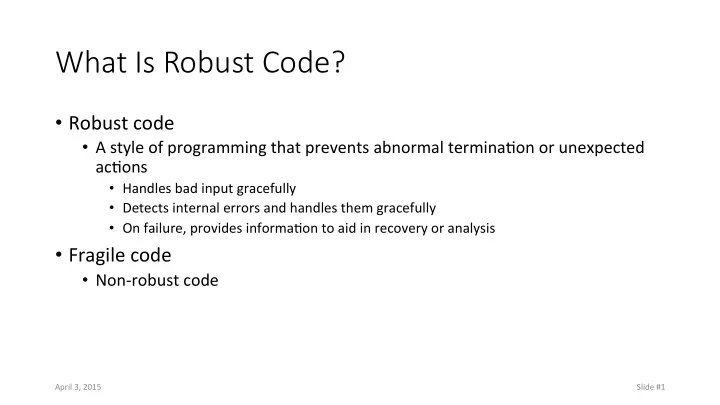

What ¡Is ¡Robust ¡Code? • Robust ¡code ¡ • A ¡style ¡of ¡programming ¡that ¡prevents ¡abnormal ¡termina8on ¡or ¡unexpected ¡ ac8ons ¡ • Handles ¡bad ¡input ¡gracefully ¡ • Detects ¡internal ¡errors ¡and ¡handles ¡them ¡gracefully ¡ • On ¡failure, ¡provides ¡informa8on ¡to ¡aid ¡in ¡recovery ¡or ¡analysis ¡ • Fragile ¡code ¡ • Non-‑robust ¡code ¡ April ¡3, ¡2015 ¡ Slide ¡#1 ¡
Example ¡of ¡Fragile ¡Code • It’s ¡always ¡fun ¡to ¡pick ¡apart ¡someone ¡else’s ¡code! ¡ • Library: ¡implement ¡standard ¡queues ¡(LIFO ¡structures) ¡ • WriSen ¡in ¡C, ¡in ¡typical ¡way ¡ • Files ¡ • queue.h ¡ • Header ¡file ¡containing ¡QUEUE ¡structure ¡and ¡prototypes ¡ • queue.c ¡ • Library ¡func8ons; ¡compiled ¡and ¡linked ¡into ¡programs ¡ April ¡3, ¡2015 ¡ Slide ¡#2 ¡
Queue ¡Structure • In ¡queue.h: ¡ /* the queue structure */ typedef struct queue { int *que; /* array of queue elements */ int head; /* head index in que */ int count; /* number of elements */ int size; /* max number of elements */ } QUEUE; April ¡3, ¡2015 ¡ Slide ¡#3 ¡
Interfaces • In ¡queue.h: ¡ • Create, ¡delete ¡queues ¡ void qmanage(QUEUE **, int, int); • Add ¡element ¡to ¡tail ¡of ¡queue ¡ void put_on_queue(QUEUE *, int); • Take ¡element ¡from ¡head ¡of ¡queue ¡ void take_off_queue(QUEUE *, int *); April ¡3, ¡2015 ¡ Slide ¡#4 ¡
How ¡To ¡Mess ¡This ¡Up • Create ¡queue ¡ • Change ¡counter ¡value ¡ QUEUE *xxx; … qmanage(&xxx, 1, 100); xxx->count = 99; • Now ¡the ¡queue ¡structure ¡says ¡there ¡are ¡99 ¡elements ¡in ¡queue ¡ April ¡3, ¡2015 ¡ Slide ¡#5 ¡
qmanage /* create or delete a queue * PARAMETERS: QUEUE **qptr pointer to, queue * int flag 1 for create, 0 for delete * int sizemax elements in queue */ void qmanage(QUEUE **qptr, int flag, int size) { if (flag){ /* allocate a new queue */ *qptr = malloc(sizeof(QUEUE)); (*qptr)->head = (*qptr)->count = 0; (*qptr)->que = malloc(size * sizeof(int)); (*qptr)->size = size; } else{ /* delete the current queue */ (void) free((*qptr)->que); (void) free(*qptr); } } April ¡3, ¡2015 ¡ Slide ¡#6 ¡
Adding ¡to ¡a ¡Queue /* add an element to an existing queue * PARAMETERS: QUEUE *qptr pointer for queue involved * int n element to be appended */ void put_on_queue(QUEUE *qptr, int n) { /* add new element to tail of queue */ qptr->que[(qptr->head + qptr->count) % qptr->size] = n; qptr->count++; } ¡ April ¡3, ¡2015 ¡ Slide ¡#7 ¡
Taking ¡from ¡a ¡Queue /* take an element off the front of an existing queue * PARAMETERS: QUEUE *qptr pointer for queue involved * int *n storage for the return element */ void take_off_queue(QUEUE *qptr, int *n) { /* return the element at the head of the queue */ *n = qptr->que[qptr->head++]; qptr->count--; qptr->head %= qptr->size; } ¡ April ¡3, ¡2015 ¡ Slide ¡#8 ¡
Robust ¡Programming • Basic ¡Principles ¡ • Paranoia: ¡don’t ¡trust ¡what ¡you ¡don’t ¡generate ¡ • Stupidity: ¡if ¡it ¡can ¡be ¡called ¡(invoked) ¡incorrectly, ¡it ¡will ¡be ¡ • Dangerous ¡implements: ¡if ¡something ¡is ¡to ¡remain ¡consistent ¡across ¡calls ¡ (invoca8ons), ¡make ¡sure ¡no-‑on ¡else ¡can ¡access ¡it ¡ • Can’t ¡happen: ¡check ¡for ¡“impossible” ¡errors ¡ • Think ¡“program ¡defensively” ¡ April ¡3, ¡2015 ¡ Slide ¡#9 ¡
Queue ¡Structure • It’s ¡a ¡dangerous ¡implement ¡ • We ¡never ¡make ¡it ¡available ¡to ¡the ¡user ¡ • Use ¡ token ¡to ¡index ¡into ¡array ¡of ¡queues ¡ • Use ¡this ¡trick ¡to ¡prevent ¡“dangling ¡reference” ¡ • Include ¡in ¡each ¡created ¡token ¡a ¡ nonce ¡ • When ¡referring ¡to ¡queue ¡using ¡token, ¡check ¡that ¡index ¡ and ¡nonce ¡are ¡both ¡ac8ve ¡ • But ¡won’t ¡token ¡of ¡0 ¡or ¡1 ¡be ¡valid ¡always? ¡ • Construct ¡token ¡so ¡they ¡are ¡not ¡ April ¡3, ¡2015 ¡ Slide ¡#10 ¡
Example ¡Token • Need ¡to ¡be ¡able ¡to ¡extract ¡index ¡and ¡nonce ¡from ¡it ¡ token = ((index + 0x1221)<<16)|(nonce+0x0502) • Ques8on: ¡what ¡assump8ons ¡does ¡this ¡token ¡structure ¡make? ¡ • Define ¡a ¡type ¡for ¡convenience ¡ typedef long int QTICKET; • Lesson: ¡don’t ¡return ¡pointers ¡to ¡ internal ¡structures; ¡use ¡tokens ¡ April ¡3, ¡2015 ¡ Slide ¡#11 ¡
Error ¡Handling • Need ¡to ¡dis8nguish ¡error ¡codes ¡from ¡legi8mate ¡results ¡ • Conven8on: ¡all ¡error ¡codes ¡are ¡ nega.ve ¡ • Conven8on: ¡every ¡error ¡produces ¡a ¡ text ¡message ¡saved ¡in ¡an ¡externally ¡ visible ¡buffer ¡ /* true if x is a qlib error code */ #define QE_ISERROR(x) ((x) < 0) #define QE_NONE 0/* no errors */ /* error buffer; contains message describing * last error; visible to callers */ extern char qe_errbuf[256]; April ¡3, ¡2015 ¡ Slide ¡#12 ¡
Recommend
More recommend